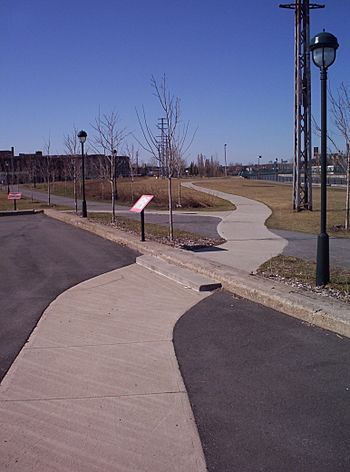Saint Pierre River (Montreal) facts for kids
Quick facts for kids Saint-Pierre River |
|
|---|---|

Memorial site of the former site of the Saint-Pierre River near the locks of the St. Paul-Coast on Lachine Canal
|
|
| Country | Canada |
| Province | Quebec |
| Physical characteristics | |
| River mouth | St Lawrence River, Montreal 9 m (30 ft) 45°30′11″N 73°33′12″W / 45.50306°N 73.55333°W |
The Saint Pierre River was a river that once flowed through the city of Montreal, Quebec, in Canada. It emptied into the mighty St. Lawrence River. The city of Montreal was actually founded right where this river met the St. Lawrence, near a place now known as the Pointe-à-Callière Museum.
Contents
What Was the Saint Pierre River Like?
The Saint Pierre River started in the western part of Montreal Island. It had two main branches. One branch flowed towards what is now the Old Port of Montreal. The other branch joined the St. Lawrence River near the Montreal Aqueduct in Verdun.
Where Was Otter Lake?
Not far from the Saint-Jacques escarpment, the river formed a small lake called Otter Lake. Today, this area is where the large Turcot Interchange highway system is located.
Why Was the Saint Pierre River Buried?
For a long time, people living near the Saint Pierre River used it like a sewer. This meant a lot of waste went into the river, making it unhealthy and unsafe.
When Did the River Disappear?
In 1832, officials decided it was best to bury the river. They channeled it underground in the area near the Pointe-à-Callière Museum. Over the next few decades, other parts of the river were also buried.
As the city grew, new buildings and roads were built over the river's path. By 1990, the underground channel was filled with sand. This made the Saint Pierre River completely disappear from view.
Can You Still See Parts of the River?
Even though the river is gone, you can still find clues about it! Some parts of the old underground sewer system can be seen at the Pointe-à-Callière Museum. Also, a small section of its original path is visible near the Côte-Saint-Paul locks of the Lachine Canal.
Images for kids
 | Jessica Watkins |
 | Robert Henry Lawrence Jr. |
 | Mae Jemison |
 | Sian Proctor |
 | Guion Bluford |





